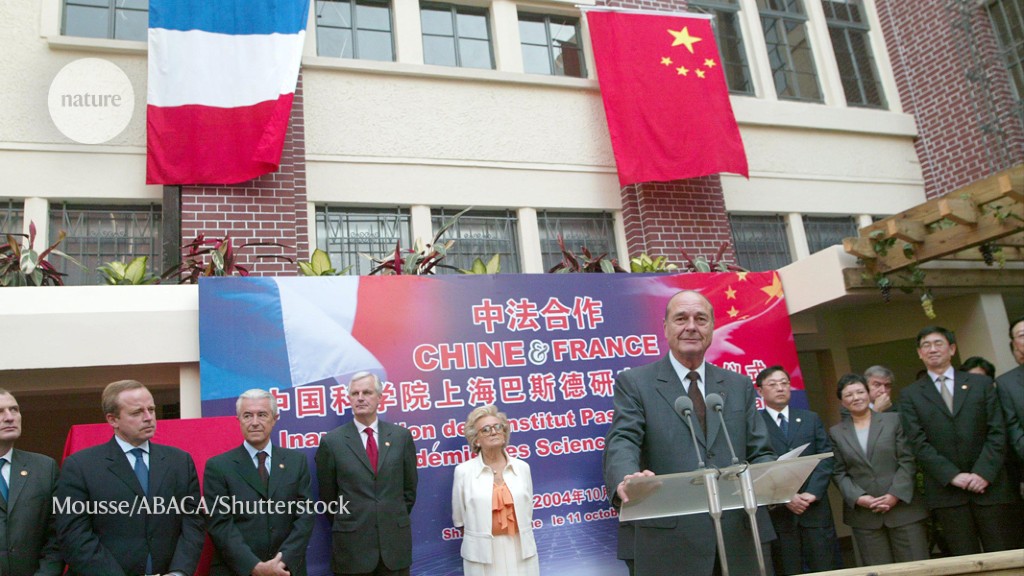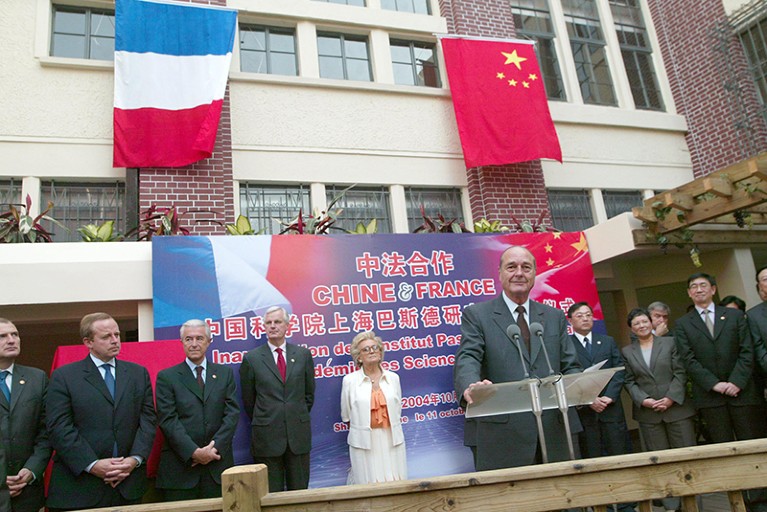The French president at the time, Jacques Chirac (at podium), attended the inauguration of the Pasteur Institute of Shanghai in China in 2004.Credit: Mousse/ABACA/Shutterstock
The influential Pasteur Institute in Paris says it has suspended its partnership with the Chinese Academy of Sciences (CAS), Beijing, and will cease to co-lead an institute in Shanghai, Nature has learnt.
The Pasteur Institute of Shanghai was established in 2004 as a scientific partnership between France and China, focused on infectious-disease research. Over the years, researchers at the institute have studied viruses from hepatitis C to Ebola, Zika, HIV and SARS-CoV-2, and contributed to the development of vaccines and treatments, including a candidate drug to treat hand, foot and mouth disease, and a norovirus vaccine. As of last August, the institute had 146 staff members, including 35 principal investigators, as well as 29 postdoctoral fellows. Roughly 9% of the staff and postdoctoral fellows had a non-Chinese background.
But a spokesperson for the Pasteur Institute told Nature that the organization decided to cease co-leading the Pasteur Institute of Shanghai with CAS in December 2022, after a year of dialogue between the two organizations. “This choice was made in order to begin a new cycle of conversations for improving the relationship between the two organizations and finding a more productive way to work together,” they said.
As a result, the Pasteur Institute is no longer involved in the activities of the Pasteur Institute of Shanghai, which is now being supervised by CAS, and the Chinese facility’s name will change, the spokesperson said.
A spokesperson for CAS said the two institutes have maintained a long-term and friendly partnership, and CAS has “deep gratitude” for the Pasteur Institute and the contributions of French scientists.
The two institutes are “actively exploring new collaboration options, rather than the form of ‘a joint institute’, to better tackle global challenges in infectious-disease research”, said CAS.
The Pasteur Institute and CAS did not respond to Nature’s questions about how the break-up will affect funding at the Shanghai institute. In 2022, the facility had a budget of some 248 million Chinese yuan (US$36 million), according to its financial statements.
Scientists react
The full circumstances of what initiated the break-up are not clear, but the news has taken many researchers by surprise. It “does potentially signal the end of an era of scientific partnership”, says Alice Hughes, a conservation biologist at the University of Hong Kong, who collaborates with researchers at the Shanghai institute.
There was much fanfare over the institute’s launch in 2004 — the French president at the time, Jacques Chirac, attended its inauguration. And its founding director, virologist Vincent Deubel, was the first foreigner to head a scientific institute on the Chinese mainland.
At the time, China was not a leader in many research fields, says Hughes. But it is now an established scientific powerhouse, so CAS might not see so much value in co-leading such an institution with a foreign organization, says Hughes.
The break in ties could also signal that China’s “era of internationalization” in research is over, she says, and that although foreign researchers are welcome at Chinese research institutions, they might not be able to co-lead them. It represents a significant loss for the Pasteur Institute in the region, she says.
But others disagree that the news reflects a broader trend. “This is just an individual case,” says Ke Lan, a virologist at Wuhan University in China, who worked at the Shanghai institute between 2006 and 2016. Lan says the news is regrettable, and that the Chinese government encourages international scientific collaboration, which is still very active in the field of life sciences and necessary for infectious-disease research.
This is a breaking news story and will be updated throughout the day.



More News
The Amazon’s gargantuan gardeners: manatees
Publisher Correction: Single-crystalline metal-oxide dielectrics for top-gate 2D transistors – Nature
The baseless stat that could be harming Indigenous conservation efforts